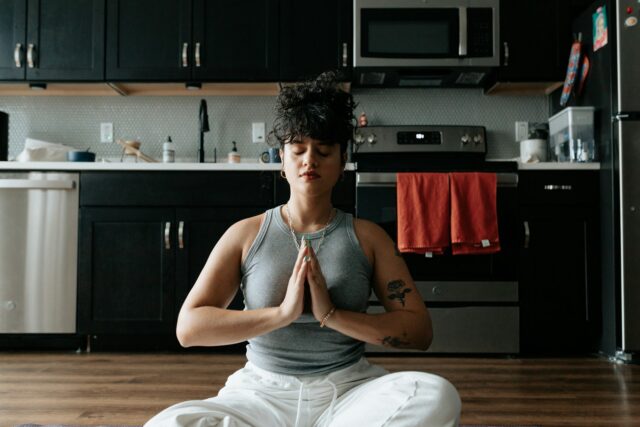Is it just me, or are panic attacks way more common than they used to be?

According to Bupa, 1 in 3 adults have experienced panic attacks at some point in their lives — and that’s a pretty huge number. It makes sense, really, given the state of the world, but that doesn’t make them any easier to deal with when they strike. The next time you find yourself panicking, here are some steps you can take to restore a bit of calm. They really do help me, and I hope they help you.
1. Take a few deep breaths to reset your system.

When panic strikes, your breathing often becomes shallow and rapid. By consciously slowing it down, you can trigger your body’s relaxation response. Try breathing in for four counts, holding for four, then exhaling for four. Repeat this pattern a few times, and you’ll likely notice your heart rate slowing and your muscles relaxing.
2. Ground yourself by focusing on your senses.
 Source: Unsplash
Source: Unsplash Panic can make you feel disconnected from reality. To counter this, try the 5-4-3-2-1 technique. Name five things you can see, four things you can touch, three things you can hear, two things you can smell, and one thing you can taste. This simple exercise helps anchor you in the present moment and distracts your mind from anxious thoughts.
3. Splash some cold water on your face to shock your system.
 Source: Unsplash
Source: Unsplash This might sound odd, but it really works. The sudden sensation of cold water activates your body’s dive reflex, which can quickly slow your heart rate and calm your nervous system. It’s a quick and easy way to interrupt the cycle of panic and give yourself a moment to reset.
4. Try progressive muscle relaxation to release tension.

Panic often causes us to tense up without realising it. Start at your toes and work your way up, tensing each muscle group for a few seconds before relaxing it completely. This helps you become aware of where you’re holding tension and gives you a way to actively release it, promoting a sense of calm throughout your body.
5. Use positive self-talk to reassure yourself.

Your inner dialogue can have a powerful effect on your emotions. Instead of letting panic-fuelled thoughts run wild, try repeating calming phrases to yourself. Something like “This feeling will pass” or “I am safe” can be surprisingly effective. It might feel a bit silly at first, but give it a try — you might be surprised at how much it helps.
6. Distract yourself with a simple counting task.

Sometimes, the best way to calm panic is to give your mind something else to focus on. Try counting backwards from 100 by 7s, or recite the alphabet backwards. These tasks are just challenging enough to require your concentration, helping to shift your focus away from anxious thoughts and sensations.
7. Move your body to release pent-up energy.

Panic often comes with a surge of adrenaline, leaving you feeling jittery and on edge. Instead of fighting it, try channelling that energy into movement. Go for a brisk walk, do some jumping jacks, or even dance around your room. Physical activity can help burn off that excess energy and release tension-busting endorphins.
8. Hum or sing to regulate your breathing.

This might sound strange, but humming or singing can actually help regulate your breathing and calm your nervous system. The vibrations produced by humming have a soothing effect on your body, and singing forces you to take deeper breaths. Plus, it’s hard to feel panicked when you’re belting out your favourite tune!
9. Try the ‘butterfly hug’ technique for self-soothing.
 Source: Unsplash
Source: Unsplash Cross your arms over your chest, with your hands resting just below your collarbones. Alternately tap your hands on your chest, as if mimicking a butterfly’s wings. This simple action can be surprisingly calming, as it combines the soothing effect of touch with bilateral stimulation (alternating right-left movements), which can help reduce anxiety.
10. Engage in a repetitive task to occupy your mind.
 Source: Unsplash
Source: Unsplash Repeating a simple action can help ground you and give your mind something to focus on besides your panic. Try sorting a deck of cards by suit, counting paper clips, or even folding laundry. The key is to choose something that requires just enough attention to distract you without being too challenging.
11. Use visualisation to transport yourself to a calm place.
 Source: Unsplash
Source: Unsplash Close your eyes and imagine yourself in a peaceful setting — perhaps a quiet beach, a serene forest, or your favourite cosy spot at home. Try to engage all your senses in this visualisation. What do you see, hear, smell, and feel in this calm place? This mental escape can provide a much-needed break from the intensity of panic.
12. Write down your thoughts to get them out of your head.
 Source: Unsplash
Source: Unsplash Sometimes, panic can feel like a jumble of racing thoughts. Grabbing a pen and paper (or your phone’s notes app) and jotting down what you’re feeling can help externalise those thoughts. Don’t worry about spelling or grammar — just let it all pour out. Often, seeing your worries written down can make them feel more manageable.
13. Try the ‘ice dive’ technique for quick relief.
 Source: Unsplash
Source: Unsplash Fill a bowl with ice water and dunk your face in it for a few seconds. This might sound extreme, but it’s actually a powerful way to trigger your body’s calming response. The sudden cold shocks your system and can quickly reduce anxiety symptoms. If dunking your face feels too intense, try holding an ice pack to your cheeks instead.
14. Focus on helping someone else to shift your perspective.
 Source: Unsplash
Source: Unsplash When you’re in the grip of panic, it’s easy to become overly focused on yourself. Try shifting your attention outward by doing something kind for someone else. Send a supportive text to a friend, leave a nice comment on social media, or even just smile at a stranger. These small acts can help pull you out of your own head and remind you of your connection to the people around you.




